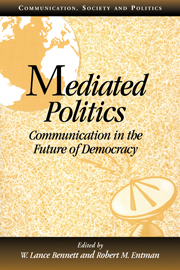Book contents
- Frontmatter
- Contents
- List of Figures
- List of Tables
- Contributors
- Preface
- Acknowledgments
- 1 Mediated Politics: An Introduction
- Part 1 Democracy and the Public Sphere
- Part 2 Citizens, Consumers, and Media in Transition
- Part 3 Mediated Political Information and Public Opinion
- Part 4 Mediated Campaigns
- Part 5 Citizens: Present and Future
- 19 Citizen Discourse and Political Participation: A Survey
- 20 Adapting Political News to the Needs of Twenty-First Century Americans
- 21 National Identities and the Future of Democracy
- 22 Communication in the Future of Democracy: A Conclusion
- Index
19 - Citizen Discourse and Political Participation: A Survey
Published online by Cambridge University Press: 05 June 2012
- Frontmatter
- Contents
- List of Figures
- List of Tables
- Contributors
- Preface
- Acknowledgments
- 1 Mediated Politics: An Introduction
- Part 1 Democracy and the Public Sphere
- Part 2 Citizens, Consumers, and Media in Transition
- Part 3 Mediated Political Information and Public Opinion
- Part 4 Mediated Campaigns
- Part 5 Citizens: Present and Future
- 19 Citizen Discourse and Political Participation: A Survey
- 20 Adapting Political News to the Needs of Twenty-First Century Americans
- 21 National Identities and the Future of Democracy
- 22 Communication in the Future of Democracy: A Conclusion
- Index
Summary
There has been a chorus of concern recently about citizen politics in the United States. Etizioni (1993) and Bellah (1992) have sounded these themes, and Putnam (1995) has sharpened the point when arguing that watching television has absorbed energies that voters might otherwise have devoted to political matters. Other scholars argue that economic and historical upheavals (Nye et al. 1997), inadequate amounts of political information (Delli Carpini and Keeter 1996), onerous voter registration laws (Piven and Cloward 1988), and even the emergence of a “culture of cynicism” (Stivers 1994) have sapped people's political commitments.
Scholars in the present volume are also concerned with such matters. In Chap. 8, for example, Michael Delli Carpini and Bruce Williams worry that entertainment television may diminish the public's willingness to think about the world in genuinely political ways. In Chap. 15, Kathleen Jamieson examines how clandestine forms of issue advocacy are now capable of changing people's attitudes without their knowing it. In Chap. 7, Oscar Gandy details the dangers associated with excessive segmentation of the electorate, a condition that depletes what all Americans know in common and, hence, what they feel in common. Finally, In Chap. 17, Bruce Buchanan observes that many Americans now think of voting as their sole public duty, as if citizenship were a sporadic rather than a continuing obligation for them.
Most of these scholars are concerned with citizens' failures to be politically active. A more hopeful approach is to ask why some Americans choose the opposite course – to pay attention to politics and to argue and debate the issues of the day. That is my approach here.
- Type
- Chapter
- Information
- Mediated PoliticsCommunication in the Future of Democracy, pp. 407 - 432Publisher: Cambridge University PressPrint publication year: 2000
- 4
- Cited by



